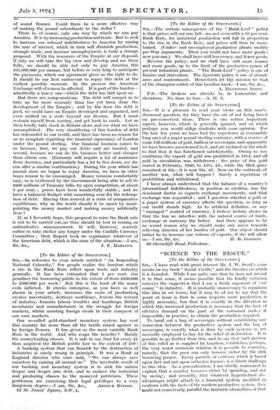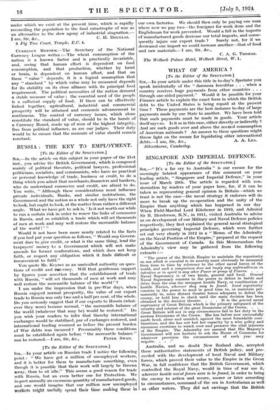"SCIENCE TO THE RESCUE."
[To the Editor of the SPECTATOR.]
SIR,—I have read with great interest Mr. J. W. Scott's corn. meats on my book " Social Credit," and the theories on which it is founded. While I am quite sure that he does not intend it in that sense, it seems possible that his kindly criticism conveys the suggestion that I am a frank exponent of "ca' canny " in industry. It is probably unnecessary to repudiate this idea in set terms, but it may be of use to say that the point at issue is that in some respects more production is
highly necessary, but that it is exactly in the direction in which this increased production is necessary that the lack of effective demand on the part of the consumer, makes it impossible, in practice, to obtain the production required.
To hand out a bag of sovereigns without establishing any connexion between the productive system and the bag of sovereigns, is exactly what is done by such systems as are normally employed to-day for the relief of destitution. It is possible to go further than this, and to say that such portion of this relief as is supplied by taxation, establishes, perhaps, the very worst economic relation it is possible to conceive,, namely, that the poor can only become richer by the rich becoming poorer. Every particle of evidence which is based upon fact and not upon orthodox finance, is a direct challenge to this idea. As a generalisation, I am chiefly concerned to explain that a country becomes richer by spending, and not by saving ; and secondly, that whatever hypothetical dis- advantages might attach to a financial syfitem modified to conform with the facts of the modern productive system, they could not conceivably parallel the fantastic absurdities of that
under which we exist at the present time, which is rapidly reconciling the population to the final catastrophe of war as an alternative to the slow agony of industrial stagnation.—
CURRENCY REFORM.—The Secretary of the National Currency League writes :—The wheat consumption of the nation is a known factor and is practically invariable, and, seeing that human effort is dependent on food consumption, and that production, whether, by hand or brain, is dependent on human effort, and that on these " value " depends, it is a logical assumption that any " standard " by which value may be measured depends for its stability on its close alliance with its principal food requirement. The political necessities of the nation demand a stable measure of value ; the essential need of the people is a sufficient supply of food. If these can be effectively linked together, agricultural, industrial and commercial prosperity will be attained and economic advancement be continuous. The control of currency issues, which alone constitute the standard of value, should be in the hands of a Currency Board, made up of men of the highest integrity, free from political influence, as are our judges. Their duty would be to ensure that the measure of value should remain constant.



















































 Previous page
Previous page